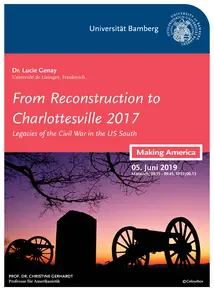Dr. Lucie Genay (Université de Limoges, France): "From Reconstruction to Charlottesville 2017: Legacies of the Civil War in the US South"
Wednesday, 05.06.2019, 8:15-9:45 a.m., SP17/00.13
In November 2018, the Texas Board of Education voted to change the way schools in the state will teach the US Civil War (1861-1865), with slavery as the primary cause of the war while states’ rights and sectionalism will be downgraded to contributing factors. Why did it take so long for the Lone Star State to make a decision that seems long overdue to the descendants of the victims of the slave-labor system in the US? Do the statues of Confederate Generals and the Confederate flag belong in museums rather than in front of southern states’ capitols? Did slave labor truly end with the 13th Amendment in 1865 and does President Abraham Lincoln deserve his reputation as the Great Emancipator? How did US prisons come to be disproportionately filled with African-American inmates? These are the questions that were addressed in this lecture on the legacies of the Civil War to put the struggles of today’s US society under the enlightening beam of the past.
Lucie Genay is an Associate Professor of US civilization in the English and American studies department at the University of Limoges, France. She specializes in the history of the nuclear weapons industry, the Manhattan Project, the Cold War and their socioeconomic, environmental, and cultural impacts in the Southwest of the US in the 20th and 21st centuries. The University of New Mexico Press is publishing a book this year adapted from her doctoral dissertation: The Land of Nuclear Enchantment: A New Mexican History of the Nuclear Weapons Industry. In this book as well as her other publications, she explores the themes of memory, social and oral history, domestic colonialism, and environmental justice. Her current research project is on the Pantex nuclear assembly plant in the Panhandle of Texas. The courses she teaches at Unilim address the following topics: the birth of the US, the US in the Cold War, US imperialism, the history of the US West, Native American history, and the legacies of the Civil War.
